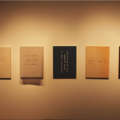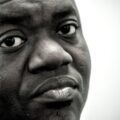Chekhov’s Silence

I picked up Checkhov’s story “The Kiss” as an undergraduate who had never read a Russian author. The story has a fairly simple plot: along with his artillery brigade, Staff-Captain Ryabovich is invited to a Lieutenant-General’s home for tea and conversation.
At the party, we find that Ryabovich is just as uncomfortable around the men as he is the women. “While his fellow-officers were trying to look serious or force a smile, his face, lynx-like whiskers and spectacles seemed to be saying, ‘I’m the shyest, most modest and most insignificant officer in the whole brigade!’’
He is the introvert’s everyman. After leaving the ballroom for billiards, and the billiards for a return to the ballroom, alone and awkward, Ryabovich finds himself in a pitch-black room.
Ahead of him he could see light coming through a crack in the door and beyond was the muffled sound of a sad mazurka. The windows here had been left open as they had in the ballroom and he could smell poplars, lilac and roses…
Ryabovich stopped, undecided what to do…Just then he was astonished to hear hurried footsteps, the rustle of a dress and a female voice whispering breathlessly, ‘At last!’ Two soft, sweet-smelling arms (undoubtedly a woman’s) encircled his neck, a burning cheek pressed against his and at the same time there was the sound of a kiss.
But the kiss from the unknown woman is a mistake, and she shrinks back into the dark. Nevertheless, Ryabovich has been changed. Chekhov’s prose speeds up accordingly. The colors and sounds that made Ryabovich anxious before are now illustrations of his high spirits. Everything is new, and he watches the women in the ballroom, giddily considering which one had kissed him.
Like a teenage boy just now hitting puberty, he picks and chooses features from the women, building up a perfect beauty. “If I could just take the lilac girl’s shoulders and arms away, add the blonde’s temples, then take those eyes away from the girl on Lobytko’s left.” Mystery becomes fantasy, and Ryabovich leaves the party, and the town, threading a dream life out of the kiss.
In almost everything we do except sleep, we spend our time removing silences.
Our unease is an instinctual mistrust; predators arrive out of the quiet. The bit of squirrel in our brain, the deer running up our spine, strains to hear feet in the grass. Or, more accurately for us, the creak on the stairs. Silence precedes tsunamis and succeeds war. We use silence as a memorial to the terrible and traumatic.
Generally speaking, however, we are capable of keeping ourselves inside sound (even in deafness, music vibrates, lips can be read). We carry sound not only in our smartphones, but in our throats and hands and feet. We have a permanent capacity for it.
And then there is the silence that cannot be cured with sound, one not found in the absence of music, but of life. It comes under a variety of names, ranging from ennui to manic depression. It is the slow or fast, violent or gradual succumbing to a silence that exists directly inside. It’s what comes to a species that must have an explanation for itself, whether be divine purpose, or growing vegetables in the garden.
Sounds, like the buzz of cities and the romance of a song, often only make it worse.
In among those varieties is one silence in particular that disturbs me, one that we find in the unfinished, in the premature departure – the tablecloth swiped from the table, leaving all the glasses and cutlery in place. This silence is conjured by lost friendships and memories; in the cooling off process after a romantic relationship, when the anger has burned up and the relationship is reperceived, held against the light of two different people. Because unless you commit some drastic crime, like cheat or attack your partner, relationships usually erode like coastlines.
Likewise, you often don’t know it will be the last time you see a friend until years later. It’s a silence formed by the threads of life that were once joined with ours, but have now stretched off to who knows where, into lives no more known to us than a stranger’s (social media, while it might seem like a remedy to this, only exacerbates the feeling: all we see is what the public sees). It’s the silence of a sudden vacancy – some of the items might still be in the room, some packaging in the bin, but the resident has left.
It is a dull ache that can only arrive with realisation, a mental expression of, oh, that’s gone now; a realisation of the irretrievable.
“Ryabovich took a last look at Mestechki and he felt so sad, as he if were saying farewell to what was very near and dear to him.” This sounds, to me, like the last line of a story, and if it were the last line, this would be the account of a soldier who was kissed by a stranger and who, perhaps for the first time, falls in love.
But the story continues, “there were only long-familiar, boring scenes ahead of him.”
To stave off the boredom of monotonous landscapes and army protocol, Ryabovich applies his imagination to the faceless woman of his hypothetical courtship: marriage, children, family dinner.
Eventually the story, and Ryabovich, circle back to Mestechki, where he isn’t invited to the general’s home, and suddenly, reality returns; the old-world persists, and in the town’s river, “[t]he water raced past and he did not know where or why; it had flowed just as swiftly in May.”
“The Kiss” left a mark on me. It passed on all of Ryabovich’s tragic hope, and I couldn’t understand how the story had ended. Every one of Chekhov’s short stories is – though they all take place in Russia and are peopled with similar classes of character – only a brief view of a huge structure; as huge as at least one lifetime.
I don’t know what the word is for it (German or Japanese usually have one at hand), but the best I can come up with is pre-nostalgia. Rather than a yearning for a gold-tinted, romanticised past self, it’s paradoxically the loss of future memories, as if we’ve been robbed of experience.
That doesn’t mean that I’d want a past relationship to restart now, or to retrieve a past friend. Like nostalgia, its inversion is an awareness that these things exist elsewhere, for another version of ourselves. And in regard to people we no longer know, a desire to snoop into their present lives and, for a minute or an hour, come to understand them again.
A microcosm of this can be found in a busy airport or train station, and is probably why, in some morbid way, I enjoy sitting in them. After an hour or two of watching so many hundreds of people appear and vanish, you begin to feel how many lives brush against your own.
Neither do I know when I first became aware of this that I’m calling a silence, but I do remember wondering if it was only me who felt it. This would have been around the age when I still considered myself central to events, but old enough to have experienced a memorable loss.
Of course, I quickly learned that every adult knows the feeling. The fact that we rarely hear it discussed is the same reason we struggle with all varieties of silence: it has no voice.
Two opinions of Hemingway’s seem particularly relevant here: his iceberg metaphor, that 90% of what goes into writing should be below the surface, and that Chekhov wrote “five or six good stories.”
All of Chekhov’s stories are icebergs. Their brutal, clean peaks serve as warnings of a submerged body. His prose is the living text of that unspoken silence, of pre-nostalgia. It is Ryabovich with the lasting sensation of lips on his cheek; Ryabovich’s loneliness, weaving a doppelganger life; Ryabovich sunk back to ordinary numbness, where “the whole world, the whole of life, struck Ryabovich as a meaningless, futile joke.”
In How to Read and Why, Harold Bloom says of “The Kiss” that “Ryabovich may think that his fate in life is settled, but it certainly isn’t, though we will never know, since that lies beyond the story.” That is Chekhov’s genius and his offering as an artist: what he allows to lie beyond the edges of the story.
For all we know, Ryabovich will fall in love again the following year. He might die before he gets old, like Chekhov did, of tuberculosis. We’ll never know.
I believe that the best writers pioneer something new. Not a new story, but a new way of telling the old ones (all we’ve ever had are old stories).
Dickens, throwing his prose around like a drunk in a courtyard, fashioned the new epic and asked everything of plot; Proust found the gaps between memory and dream, articulated the trouble of experience and how every object holds our past; Dickinson mapped the inner life more absolutely than even Shakespeare. In the work of transcribing experience, they asked something new of their medium.
Chekhov asked his words to form the silence of irresolution. Literary speculators have often suggested successors, and though nobody can or should mirror him exactly, his silences appear: Alice Munro’s Canadian wildernesses share something of his stark Russian landscapes. Raymond Carver’s characters hum with a similar loss. Beyond literature, Sofia Coppola’s Lost in Translation felt to me like a cousin to “The Lady and the Dog” or “On the Road.” If I ever want to know what Bill Murray whispered, I can find it at the end of a Chekhov story. In every one of his sentences, there is the sense that something lies just beneath, just above, just at the periphery—he is the patron saint of the unlived life.
About Connor Harrison
Connor Harrison writes short stories, essays and poetry. His work has appeared online and in print at Literary Hub, Storgy, SPC, The Disclaimer, and in accompaniment to the 2018 Flipside Exhibition at the Fold Gallery, London. He has upcoming work at Anthropocene Poetry. He is based in the West Midlands, UK.





